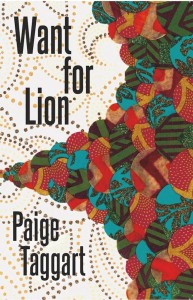 Want For Lion
Want For Lion
by Paige Taggart
Trembling Pillow Press, 2014
116 pages / $16 Buy from Trembling Pillow Press or Amazon
“I’ve always demanded more from a sunset,” says Charlotte Gainsbourg in Lars Van Trier’s Nymph()maniac. ‘Sunset’ being beauty at a distance, untouchable object of desire, lion in a cage. Gainsbourg’s character wants to throw punches, to participate in beauty’s creation. No way to interact with a sunset other than blind admiration. No way to intensify pleasure, or ruin it.
Paige Taggart shares this relationship to beauty. It’s not beauty until you draw blood. In Want For Lion, she wages war on meticulousness, employing a poetics of action, a space where beauty stems from ambition and the art of mistake-making. “There are rooms for mistakes, that shit is human, and land, and plant. Like a quilt of gold floating down the river.”
Beauty is not striking a golden pose, but falling well. I recently fell of my bike, completely unprompted, in the middle of a four way intersection, all the cars stopped at the red. A pedestrian asked if I was hurt, shaking his head, holding in laughter. I waved, “Only my pride!” How beautiful could my fall have been had I been wrapped in a quilt of gold?
*
In the section “Starts with Herds,” Taggart starts three poems with the same phrase, each time breaking it differently:
care about nothing
then care about everything
–
care about nothing then
care about everything
–
care about
nothing
then care
about everything
Originally I read a simultaneity, that “nothing” and “everything” hold equal weight, that in a way, no matter the variation in enjambment, the two are interchangeable. But “then” implies time and sequence, with “nothing” coming before “everything,” as if nothingness, an emptying out, is a rite of passage enabling one to let “everything” in. Each time, Taggart follows the phrase with imagined suggested actions, such as driving “through a wax / museum on a scooter / with Bill Clinton.”
“Then” I felt the error in my approach, deciphering intentionality a fool’s errand in a book that belittles a “majority confidently going to sleep / all plan and no action.” Again and again, Taggart favors action over premeditation. In “Get Your Slip On,” she describes her poems as “lacking a continuity that is recognizable / to the overly-cognitive eyes,” after which I feel implicated. Is that me? Am I the over-cognater? The over-cognaters Taggart confronts are often male and often cast her as an object of desire, as a sunset. “The experienced stranger / arrives with leashed intuition / and prefabricated rainbows,” knowledge and experience stifling him, resulting in inflated expectations. Don’t arrange stars into a constellation, impose sense or system. The fact that they’re stars is enough.
*
A brief recap of Hans Christian Anderson’s “The Emperor’s New Clothes”: two hustlers sell the emperor invisible formalwear. The caveat: only the worthy, those not “hopelessly stupid,” can see the clothes. The emperor, his ministers, his constituents, all inadvertently flaunt their insecurities by marveling at the nonexistent tailoring, until a child interjects: “But he’s not wearing anything at all!” The comment kicks down the floodgates of shaming, the public adeptly saving face, redirecting personal insecurities into outward ridicule of their emperor. He’s exposed, yet the tale ends with his conscious decision to continue the procession, meaning one of two things: his vanity renders him incapable of admitting defeat, or, my preferred ending, he doesn’t give a shit that he’s naked and shamed. He keeps walking.
Want for Lion as the want to be king of beasts, an emperor. But being shameless trumps being king. Kings are not animals, they’re in the cage of power, each pose carefully chosen, any stain immediately removed.
Taggart welcomes stain. From “Smothered in Emu Milk,” a section of prose poems: “After jumping around on a few clouds you get bored and start to paint with glitter.” She forgoes sky-gazing in lieu of tangible consciousness on the page. And this comfort with intuition, this breaking of male-dominated sense-making systems, fuels her bravado:
“I want to make / people feel so small that they think I’m in the sky.”
“It’s okay. One of these days you’ll see the genius in my work”
“My mind is worth a million suckled titties”
When Australian Aboriginal cultures look into the dark nebulas of the Milky Way, they see the stars as shaped like a bird in flight. They call the constellation “Emu in the Sky.”
Taggart asks, “Can there be a day to celebrate failure?” Holidays and special occasions should be less about sunset; it makes them so easily “ruined.” Days sanctioned as special, drenched in expectations of beauty. One hair out of place “ruins” a lion’s mane. Can’t one approach a day, a sky, a poem on its own terms? Want For Lion advocates the ruining of expectations as its own invisible “quilt of gold.” In the final poem of “Smothered in Emu Milk,” Taggart casts herself as both “ruined” and “ruinous.” If I fall apart, it’s by my own design.
***
Patrick Gaughan is a poet, performer, and critic. He interviews artists for “Flying Object Presents,” a monthly column in The Conversant. Find recent writing in Poor Claudia, Coldfront, Blunderbuss, Entropy, and Full Stop. His play FAST FIVE, performed by Connecticut River Valley Poets’ Theater, premieres in Northampton, MA, September 26-27. [tumblr] [twitter]
Tags: Paige Taggart, Trembling Pillow Press, Want For Lion
